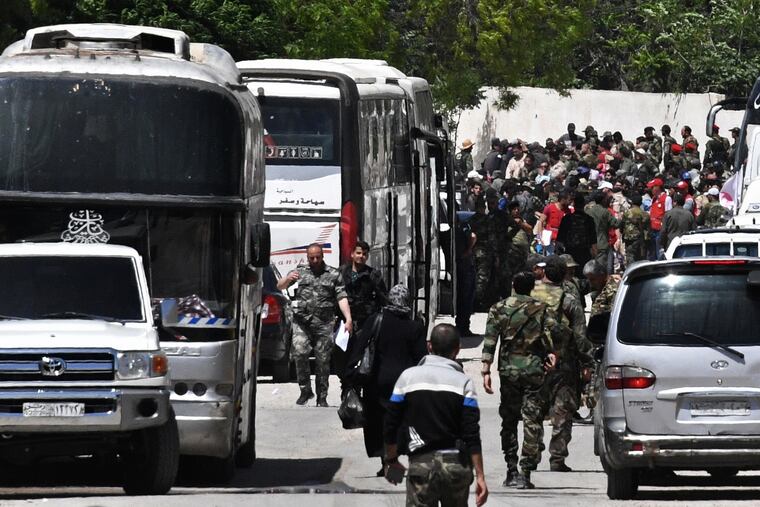Will anyone save Syrians in Idlib from possible massacre by Putin, Assad? | Trudy Rubin
Unless U.N., Trump, Turkey and West prevent carpet bombing by Assad and Putin, one million civilians are at risk, with new refugee flows.

The world is watching as Russia and the Syrian regime prepare to unleash the biggest bloodbath yet in the Syrian saga of horrors. Yet no one seems to know how to prevent a massive attack on Idlib, the last Syrian rebel-held stronghold, where nearly a million civilians are trapped.
U.N. Secretary-General Antonio Guterres just warned that a full-scale Russian assault on Idlib "would unleash a humanitarian nightmare unlike any seen in the blood-soaked Syrian conflict." Moscow rebuffed the pleas of Guterres' top emissary, who called for humanitarian corridors to allow the temporary evacuation of civilians.
Nikki Haley, the U.S. ambassador to the United Nations, warned Syrian dictator Bashar al-Assad along with his Russian and Iranian allies that "the consequences will be dire. The world will hold them responsible."
But neither Assad nor Vladimir Putin believes the world (or Washington) will lift a finger. Why should they, given the unchecked carnage they've unleashed on Syrian civilians over the last seven years, including the unpunished use of chlorine gas against civilians?
If Assad and company can commit mass murder in Idlib, despite all the advance hand-wringing, it will reconfirm something painful to admit: In today's world, we have little power to prevent the most heinous war crimes.
Idlib is a litmus test for the state of our so-called civilization. Yet, judging by recent history, those trapped in Idlib have little hope.
"The United States, the Gulf states, and Europe encouraged a lot of Syrian rebels to become involved," says noted Syria expert Joshua Landis, "and now they don't want to take responsibility. Everyone is trying to shed crocodile tears, but we're all complicit."
Let us start with President Obama and the Saudis. Eager to avoid another U.S. military involvement like Iraq, Obama subcontracted to Saudi Arabia in 2012 to help Syrian rebels eager to oust their dictator. But the Saudis and Gulf states preferred to funnel funds to Islamists rather than to more secular rebels, who might have provided a potent force had they received aid early on.
Then there is the duplicitous role of Turkey, which shares a border with Syria and opposed Assad. With Turkish help, the Idlib region became the last stand for rebels and civilians who fled other conquered cities. The rebels include tens of thousands of relative "moderates" but also around 10,000 jihadis with al-Qaeda links, whom Turkey tolerated. Those hard-line Islamists are now preventing civilians from fleeing. To save Idlib, Turkey should take on the worst jihadis, but it has shown little will.
Of course, none of this excuses the major culprits, Assad, Putin, and Iran's ayatollahs, who are indifferent to civilian suffering. In 2015, when Assad was reeling, Moscow and Tehran came to his aid. Their primary targets were not the Islamists, but the more moderate rebels who might have provided a serious alternative to Assad. With Russian aid, Assad dropped thousands of barrel bombs on rebel-held cities, such as Aleppo, deliberately targeting schools and hospitals. Rebels who surrendered were often tortured and murdered.
Now Russian officials and Assad cynically proclaim they only want to fight terrorists. Nonsense. Assad simply wants to consolidate power. Moreover, fighting terrorists does not justify the deliberate targeting of civilians, which is the trademark of Assad and his allies.
Only recently, the United Nations passed on the coordinates of 235 schools and hospitals in Idlib to Russia in hopes of sparing them from bombing; already four of the hospitals have been targeted. Moreover, the Russians – who still deny that Assad ever used chemical weapons – are proclaiming a plot by the West to organize fake chemical attacks in Idlib. What better cover story for using chlorine gas in Idlib?
The urgent question remains: What can be done to prevent the slaughter of civilians in Idlib?
President Trump has warned that a Russian attack on Idlib would be a "grave humanitarian mistake." But the president has yet to produce a coherent Syrian strategy, having placed vain hopes in Putin. The State Department has finally put a good team in place. But Washington has little leverage on Assad. Nor is Putin likely to be moved by Trump's threats.
So I see little chance to avoid a regime attack on Idlib. Therefore, the best way to save civilians is to get as many of them out of Idlib as possible before the attack starts. Global pressure must continue on Russia to permit humanitarian corridors. Over and over, Washington repeats that the blame for Idlib bloodshed would lie with Putin.
Meantime, Turkey must be encouraged to let the refugees shelter in Syrian territory it controls near the Turkish border. But that situation is only temporary. Eventually many of those refugees must leave Syria or face Assad's torture. Yet the Trump administration admits almost no refugees from Syria.
"If it's a slaughter," President Trump said of Idlib, "the United States is going to get very angry." If he truly cares about the fate of Syrian civilians, he should let thousands of them find safety here.